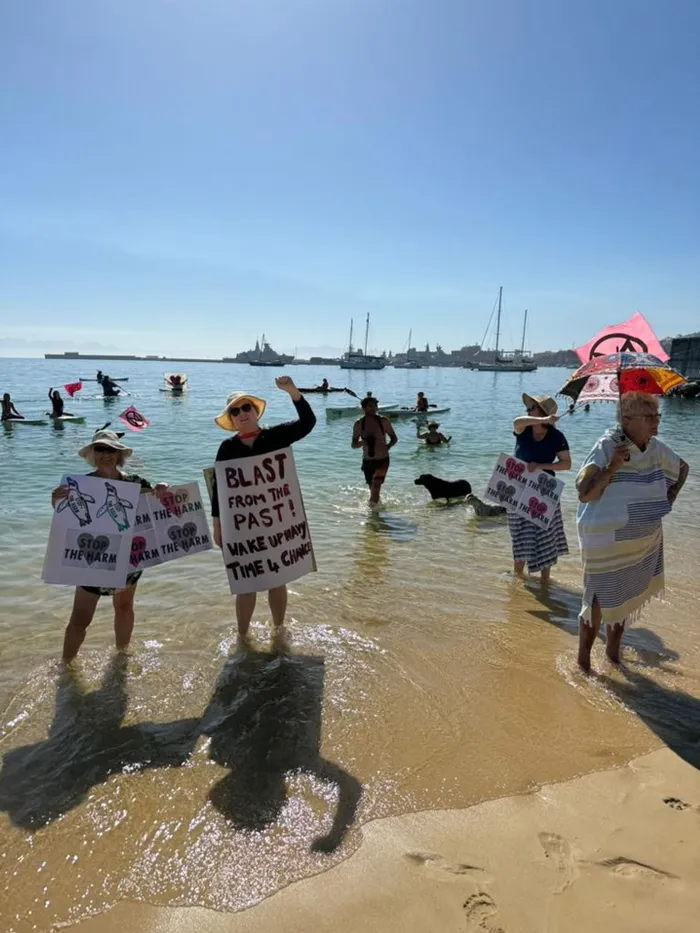SA Navy set to continue demolition training amid outcry over impact on penguins

Residents, activists and conservationist are appealing for demolition exercises by the South African Navy to end claiming it has an impact on the African Penguins who face extinction. Picture: supplied
Cape Town - The South African Navy has said they would stand their ground and continue training exercises to “prepare for any sabotage or attacks at sea”, following an outcry by activists and conservationists that the detonation of explosives could impact the extinction of the African penguins. They have called for it to end.
Researchers at the Southern African Foundation for the Conservation of Coastal Birds (Sanccob) said the latest census revealed around 8 300 breeding pairs of African penguins in the wild in South Africa and were concerned about the impact of the Navy’s exercises.
A week ago, activists, residents and conservationists carried out a protest along Long Beach calling for an end to demolition training after the Navy issued a warning via their website that they would be conducting an exercise between January 22 and February 1.
The residents and activists said they were concerned that exercises would impact wildlife such as the African penguins along the False Bay coast including the Boulders Beach colony.
This week, Commander Theo Mabina of the South African Navy told Weekend Argus they would continue with exercises until next month, as it was part of defence contingency plans and preparation which has been done for 40 years.
“The South African Navy will undertake an underwater demolitions training exercise for divers,” he said.
“This is to prepare and train them for some of their responsibilities, which include clearing harbour entrances, underwater canals, beach landings, and any other underwater demolition jobs that may arise.
“At all times, the SA Navy should maintain a capable force ready to respond to any hostile circumstance, which could include economic sabotage situations in which sea mines are put in the country’s major ports, necessitating the use of navy divers.
“As a result, training and force preparation are critical components of members’ competency and certification. This is what the organisation has been doing since its inception, as required by the Constitution and Defence Act.
“The training exercise takes place in a designated and charted shallow water. Demolitions Range Military Practice Area, is largely used for such training and exercises. The range’s limit for underwater demolitions is 5 kilometres, which has been in effect since its inception in the 1980s.
“As a norm, the SA Navy does and will always send ‘Navigational Warnings’ on these and other related activities.”

Dr Katta Ludynia, Sanccob research manager, said the numbers spoke for themselves, with a decrease in the population, and that various factors which included noise had an impact.
“Seeing the endangered status and the continuous decline of the species, we need to prevent any actions that could harm African penguins and lead to a further decline of penguin numbers. Underwater noise has been identified as one of these causes for the decline, in addition to lack of food, pollution and other factors.”
Extinction Rebellion’s Isabelle Joubert called for all exercises to end and for the truth about the impact on wildlife and sea life.
“It’s common knowledge that our oceans are under pressure from multiple fronts. Seismic blasting and oil drilling, ocean acidification from absorption of the increasing amounts of CO2 in our atmosphere, increasing temperatures and commercial fishing are just a small sample of the factors threatening aquatic life,” she said.
“With coastal wildlife already vulnerable, we want transparency about these destructive activities, including their use, necessity, and environmental impact.
“Globally, the military need to be held to far greater account for their behaviour, whether as a result of their profligate use of fossil fuels, their indiscriminate decimation of conflict zones, or their devastation of ecosystems through weapons testing, most notably in the case of the nuclear weapons tests.
“Most importantly, we call on the navy to stop their planned detonation. There are always other options.
“As far as I can see, there are no South Africa-specific studies that demonstrate the impact of underwater detonations on marine life. However, there are studies from other parts of the world which show that there is a correlation between the detonations and poor marine health and mortality.”
Lisa Garson, a False Bay resident who was part of the protest and who advocates for the penguins, said they were calling for research to be done.
“It is said extinction could be by the year 2030 and proper environmental impact assessment must be done.”
“The Navy wants to hide behind protocol.”